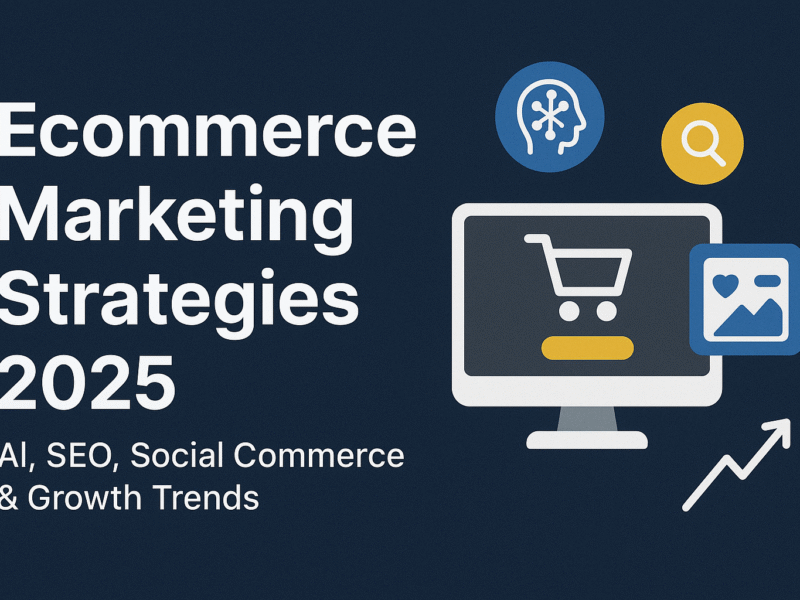In 2025, the e-commerce industry is growing at lightning speed. From small online stores to giant marketplaces, every business is competing for customer attention. With AI-driven shopping assistants, smarter Google algorithms, and customer expectations evolving every day, brands must rethink how they sell online. That’s where ecommerce marketing strategies 2025 come into play.
This blog will guide you through the latest strategies, tools, and trends that can help your e-commerce business thrive in 2025 and beyond.
Why Ecommerce Marketing Needs a New Approach in 2025
The global e-commerce market is projected to cross $8.5 trillion by 2026. But the real challenge isn’t just growth—it’s differentiation. Consumers now expect:
- Faster personalization → AI-based product recommendations
- Trust & authenticity → Verified reviews and UGC (user-generated content)
- Convenient shopping experiences → Voice commerce, AR try-ons, one-click checkouts
- Sustainability → Eco-friendly packaging and ethical sourcing
To win in this competitive landscape, your ecommerce marketing strategies 2025 must focus on personalization, SEO, social media, paid ads, and customer retention.
1. AI-Powered Personalization for Conversions
In 2025, personalization is no longer optional—it’s the backbone of successful e-commerce. With AI, businesses can:
- Show personalized product recommendations in real-time
- Use dynamic pricing based on customer behavior
- Offer AI-powered chatbots that act like shopping assistants
- Analyze purchase history to predict future buying patterns
For example, Amazon’s “frequently bought together” feature is now being replicated by smaller brands through affordable AI plugins.
2. Social Commerce: Turning Social Media Into Storefronts
Platforms like Instagram, TikTok, and YouTube Shorts are not just for engagement—they are direct sales channels. In 2025:
- Instagram Shops allow checkout without leaving the app.
- TikTok’s algorithm pushes viral product discovery.
- Influencer-driven product reviews act as modern word-of-mouth marketing.
Brands should invest in short video ads, influencer collaborations, and social-first launches to grab attention.
3. Ecommerce SEO: Still the Backbone of Organic Growth
Despite AI assistants and paid ads, ecommerce SEO remains a powerful tool in 2025. Ranking high on Google and AI-driven search ensures consistent traffic without ad spend.
Key tactics include:
- Voice search optimization → Target “conversational keywords” like “best eco-friendly sneakers under $100.”
- Product schema markup → Rich snippets with price, rating, availability.
- Image SEO → ALT tags optimized for Google Lens and AI visual search.
- Mobile-first indexing → Google prioritizes mobile UX for e-commerce rankings.
If done right, ecommerce SEO can bring in thousands of targeted visitors every month.
4. Omnichannel Marketing: Blending Online and Offline
Customers today don’t shop in one place—they jump between devices and channels. In 2025, the winning strategy is omnichannel marketing:
- Click & Collect services connecting e-commerce with physical stores.
- WhatsApp marketing for personalized deals.
- Email + SMS automation for abandoned cart recovery.
- Cross-channel retargeting ads (Facebook + Google + Instagram).
This creates a seamless customer journey, boosting conversions and loyalty.
5. Sustainability as a Marketing Strategy
Eco-conscious buyers are reshaping e-commerce. Brands that highlight sustainable practices enjoy higher trust and repeat customers.
Examples:
- Show “carbon-neutral shipping” badges.
- Share behind-the-scenes stories of eco-friendly sourcing.
- Partner with NGOs to support environmental causes.
This is more than branding—it’s a core ecommerce marketing strategy for 2025.
6. Paid Ads: Smarter, AI-Driven, and More Targeted
Google Ads and Meta Ads are evolving with AI. In 2025, ads are less about budget and more about smart targeting.
- AI-based bidding ensures better ROI.
- Dynamic Product Ads (DPA) automatically display items customers viewed.
- Performance Max campaigns integrate across Google’s ecosystem.
- Micro-segmentation → Targeting very specific audiences instead of broad demographics.
7. Voice and Visual Search: The Future of Discovery
With tools like Google Lens and smart speakers, product discovery has changed:
- Customers say: “Alexa, find me a vegan leather backpack.”
- Or they snap a picture of shoes they like and get instant product suggestions.
Brands must optimize their content for visual and voice queries to stay ahead.
8. Data-Driven Email Marketing
Email still delivers one of the highest ROIs in e-commerce. But in 2025, it’s not about generic newsletters.
- AI-personalized subject lines → Higher open rates.
- Behavior-triggered campaigns → Abandoned cart emails, back-in-stock alerts.
- Interactive emails → Polls, product carousels, gamified offers.
9. Subscription Models and Loyalty Programs
Shoppers love convenience and exclusivity. That’s why:
- Subscription boxes (e.g., beauty, fitness, snacks) are thriving.
- Loyalty points + referral discounts create sticky customers.
- Exclusive “members-only” drops drive FOMO (fear of missing out).
10. The Role of AR and VR in Shopping
Augmented reality (AR) and virtual reality (VR) let customers try before they buy:
- Virtual fitting rooms for fashion.
- AR furniture placement tools (see how a sofa fits your living room).
- Immersive brand experiences in the metaverse.
This improves trust and reduces returns.
What are the most effective ecommerce marketing strategies 2025?
Is ecommerce SEO still important in 2025?
How can small businesses compete with big brands in 2025?
How does AI impact ecommerce marketing?
What role does sustainability play in ecommerce marketing strategies 2025?
Conclusion
2025 marks a new era for online business. To win, brands must focus on AI-driven personalization, social commerce, ecommerce SEO, omnichannel strategies, and sustainable practices.
By combining these elements, your e-commerce brand won’t just survive—it will thrive in the competitive digital marketplace.
That’s the essence of ecommerce marketing strategies 2025.



